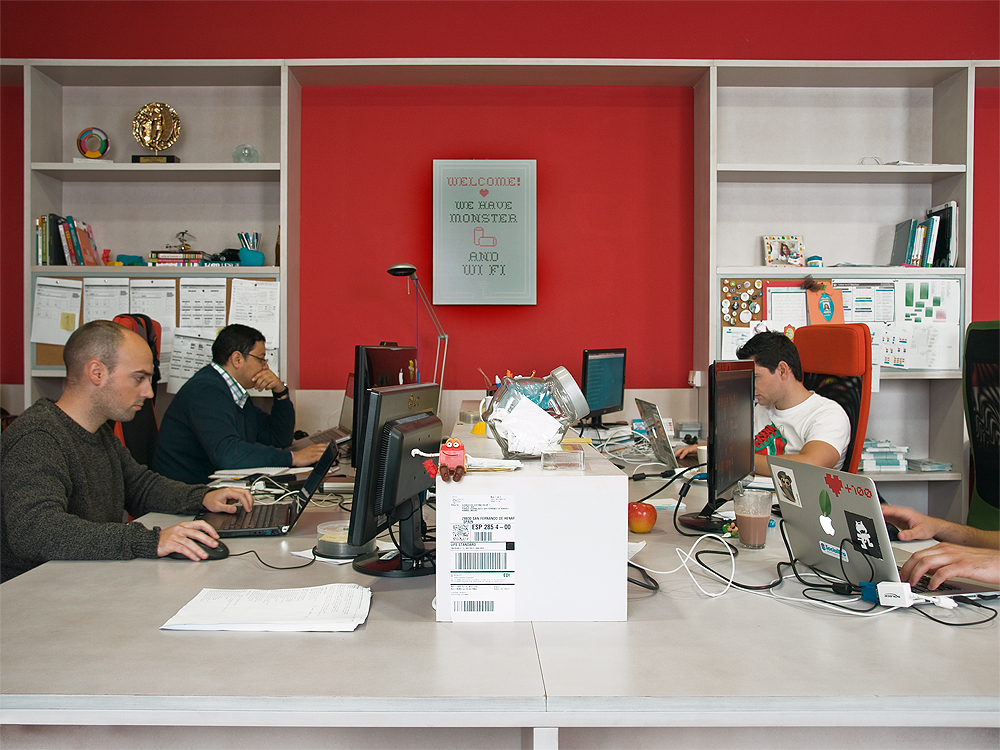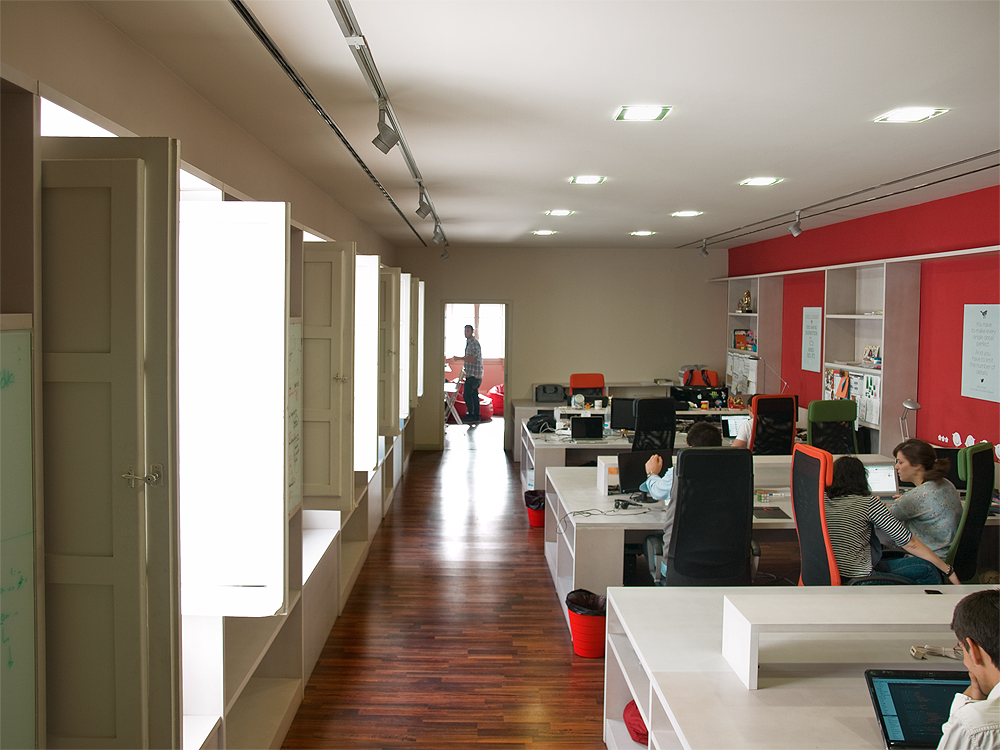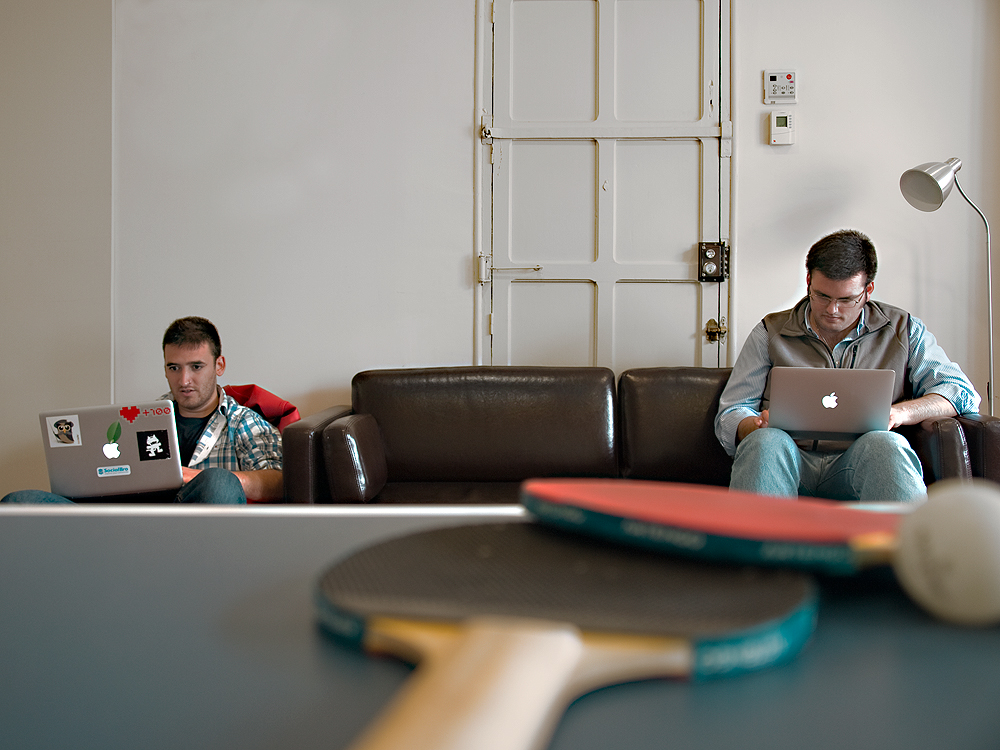
At Audiense we process more than one thousand million social profiles. We enrich them by applying several classification and segmentation algorithms to help customers such as Twitter, Telefónica, DHL, and Puma to define their marketing campaigns, identify influencers and discover new market niches.
Our challenge is to optimise the intake, enriching and storage of that growing data asset and to bring the insights computing to be as close as possible to real time.
For that we have a pipeline that ingests data from an enriching system mainly written in Node.js. This system consumes from many third party APIs and applies algorithms to infer new characteristics. This pipeline is able to keep updating a data lake of more than 100TB that is used to generate reports for our customers using Spark and Scala.
Most of our code base is a monolith written in Node.js. We are decoupling it and this is one of the biggest challenges that we are facing currently. Some parts of the platform dedicated to data processing are being rewritten in Scala and the business logic is being migrated to Typescript.
We are following Domain Driven Design, SOLID and Hexagonal Architecture principles, so we are looking for people who know and have applied them.
One of our main challenges at front-end and UX levels is to represent, in more actionable and comprensible ways, a large amount of complex information about the target audiences. For that we count on a React.js, Typescript, Redux, Webpack and Styles Components stack.
Besides the visual challenges, we have other interesting ones: improve our end2end tests base, decouple our front-end code from the monolith, develop a robust notifications system (CQRS) that enables the decoupling of the logic from the initial app boot and API calls, add a metrics system to improve performance applying better caching strategies, migrate legacy code to Typescript applying SOLID and Hexagonal Architecture.
But our users are not only our direct customers. We have a strong partnership program that we empower via a private API. This API is still in beta but already has more than 200 customers and a lot of potential for development.
All our stack is hosted in AWS, we use mainly Docker (ECS), EC2 and Lambda to execute our source code and a wide range of services like SQS and SNS for communication via events.
We have remote-first style work culture, and we have been working 100% remotely for more than 6 years. Although we have offices in London and Córdoba, our teams (management, sales, customer service, product, marketing and engineering) are distributed across different cities: London, Malaga, Madrid, Córdoba, Vigo, Seville, Granada...
Our mindset, workflows and communication assume that we are all remote. Almost everything is documented in Github: growth plans, learning path, architecture, protocols, onboarding, playbooks, design system, UX guidelines, etc. We invest everything in our power to automate our daily routines so that we can be as autonomous as possible to allow us to work remotely efficiently.
You will join a cohesive team (more than 4 years on average together) in a very collaborative environment in which you will feel cared for from the start of your onboarding.
Each team applies different agile methodologies but all follow some basic principles. We prioritize the features that bring more value to our customers and, instead of setting deadlines, we deliver small increments so that we always have a functional and deliverable version of the feature. We try to keep the number of tasks in parallel to the minimum possible. We have a few meetings scheduled but we will not miss the daily meetings, biweekly sprint planning and reviews. We have regular 1:1s with the manager and the CTO, and we do not hesitate to jump on to a hangout if a Slack or mail thread is getting longer.
We believe in extreme programming as a development technique so most of the time we do pair programming (yes, remotely) and TDD is our main tool for writing robust and testable code. Pair programming always helps us trust our code allowing for constant iterations. Once per sprint we spend time on joint code review to detect possible glitches to prioritize. We do continuous integration and we are in the process of extinguishing the branches to do trunk base development, there is a challenge here too.
The code we write today tries to respect the principles of SOLID, clean code and we apply hexagonal architecture and domain driven design when complexity requires it. Of course, we are not going to lie to you, during 6 years we have also done a lot of bad code and antipatterns; consider it an opportunity to see real examples of what not to do and to practise refactoring techniques.
We have a culture of continuous learning and we encourage this to happen during working hours. As a team we have made a pact of following a learning path, so by joining Audiense, you are committing to it too. If you have followed a similar path, we are eager to get to know you and learn from your experiences, if you haven’t, we are looking forward to supporting you with resources, time and mentoring so that we are aligned.
We are moving from a culture of silos towards a more t-shaped mentality. We are not looking for full-stack developers but for someone that no matter what his/her vocation is, to be versatile enough to assume the tasks that provide most value to our customers instead of the ones that better fit their skills.
You can learn more about our culture on our engineering blog and our Instagram account.
We would like you to have experience applying domain driven design, hexagonal architecture and that you understand the challenge of decoupling a monolith. We are currently implementing some of these services through a staggered approach, so any experience you have implementing event architecture is more than welcome.
We hope you are aligned with our core learning path (extreme programming, TDD, DDD, clean code, clean architecture, etc.) and we value all the previous experience in that sense.
We believe in pair programming and despite being remote we spend a great part of the day pairing, so we hope you feel comfortable with this practice.
Our stack is wide: Node.js (ES6 and Typescript), Scala, Python, React, MongoDB, MySQL, RabbitMQ, Redis, AWS (SNS, SQS, API Gateway, Cognito, Lambda, Redshift, Aurora, DynamoDB). However, mastering them all is not a requirement. We are more interested in the principles behind them. That said, for imminent projects, some experience with Node.js, Typescript, MongoDB, MySQL and to a lesser extent React will help you to start producing sooner. We are looking for someone with a t-shaped mentality who is also ready for frontend stack evolution.
We invest our time and support in helping each other towards continuous learning, so it is very important that you want to learn and continue practising the skills necessary to run our profession. Practise, practise, practise!
Working remotely has many advantages but also requires an extra effort of communication and responsibility, so we understand that the following skills are essential: self-management, fluid communication, respect, and inclusiveness.

Audiense enables innovative organizations to understand and apply the power of audience segmentation and insights by reinventing the use of compliant social data to make it more strategic and connect it with the business/marketing strategy to be relevant and deliver results.
Audiense’ advanced data science platform has attracted many premium clients such as Twitter, Telefónica, Puma and DHL. We have also developed important partnerships with Twitter and IBM. We are one of only two Twitter Official Partners certified for both data analysis and advertising, which ensures our clients can gather deep insights and then get the most from their investment in Twitter with advanced micro-targeting. We are also partnered with IBM Watson, which helps enrich our database with cognitive analysis, including personality, image and sentiment intelligence. This gives our clients an edge over their competitors as they can gather rich, detailed insights on audiences that matter to their business in real-time.
Founded in 2011 by Javier Burón and Alfredo Artiles, Audiense has offices in London, UK and Córdoba, Spain, and currently has 25 employees of which more than half are within engineering and product.
